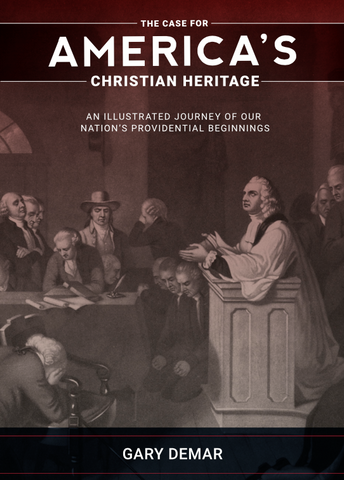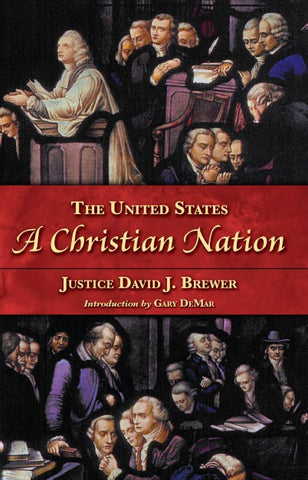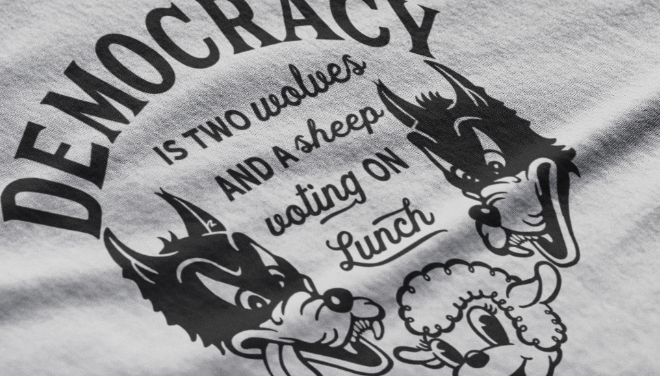Democrats are playing the Democracy card … again. Anyone who disagrees with a Leftist is anti-democratic and fascist. What Leftists like President Biden and James Carville never do is define what they mean by “Democracy.” For Democrats, “democracy” means rule by Democrats, no matter what evil scheme they may try to force on the American people. For example, to oppose killing unborn babies and believe there are only two genders is anti-democracy. According to Carville, Christians are undemocratic and are “a bigger threat than Al-Qaeda to this country.”
Carville accused Mike Johnson, the new Speaker of the House of Representatives, and other conservatives of not believing “in the Constitution” because Johnson says democracy is “two wolves and a lamb having lunch. That’s what they really, really believe and to say…. [T]hey believe that and they’re coming, and they’ve been doing it forever. They’re funded.” As if Democrats aren’t funded to the tune of billions with major social media outlets supporting them! Carville went on to say, if the Republicans win in 2024, they may get to nominate “at least two Supreme Court justices, maybe more.” Doesn’t the President have the constitutional right to appoint Supreme Court justices?
Democrats have called for stacking the Supreme Court by adding more Leftist Justices because he does not like the conservatives on the court. A very small, tiny, and miniscule majority of unelected judges making laws is not democracy. Does Carville mean that democracy includes canceling and censoring contrary opinions? Does he mean joining with the media to push a singular Leftist agenda? Anytime Democrats lose politically, they moan and groan about how Democracy is being subverted. Do they have any understanding of what they are talking about?

The Case for America's Christian Heritage
America’s original founding was rooted deeply in the things of Jesus Christ and His kingdom. The original charter given to Sir Walter Raleigh by Queen Elizabeth I in the 16th century was to establish “the true Christian faith.” John Rolfe at Jamestown sought to “advance the Honor of God and to propagate his Gospel.” The faithful Christians who wrote the Mayflower Compact stated that their mission was “for the Glory of God and advancements of the Christian faith.”
Buy NowMany attribute the “two wolves and a lamb having lunch” aphorism to Benjamin Franklin, but there is no evidence he said it, but Franklin did write in a 1773 letter, “And there is Truth in the Old Saying, That if you make yourself a Sheep, the Wolves will eat you.” Our national government is run by wolves that fleece the lambs for their own gain. See constitutional authority John Whitehead’s A Government of Wolves: The Emerging American Police State.
Here’s what Democrats mean by applied Democracy from Democrat elitist, jet-flying, yacht-owning, multi-millionaire U.S. climate envoy John Kerry said at the 2023 COP28 climate conference in Dubai. “There shouldn’t be any more coal power plants permitted anywhere in the world. That’s how you can do something for health. And the reality is that we’re not doing it.” Ronald Reagan said it best: “The nine most terrifying words in the English language are: I’m from the government, and I’m here to help.”
Democrats like Carville rarely if ever define democracy or mention that the Constitution never uses the word. In fact, as we’ll see below, our founders had great reservations about unbridled democracy, especially when voters are bought off by elected officials to gain their vote for more free stuff, greater power, and enriched stock portfolios.
Biden and Carville are not the first persons to play the anti-democracy card. It’s a typical Leftist tactic that plays on the ignorance of many Americans.
Francis A. Schaeffer described democracy as “the dictatorship of the 51%, with no controls and nothing with which to challenge the majority.”[1] Playing the percentage game, it is true that democracy can be defined as “two wolves and a lamb having lunch.” If the majority vote for rulers who promise to confiscate money from some people so it can be given to other people, that’s democracy, but it’s also theft.
As bad as Congress and the Supreme Court are, and as free spending as the Republicans have been under Republican and Democrat presidents, is democracy what we want, especially when Christians as a group do not participate in politics in great numbers, and many who do vote often also want “goodies” from the government in the name of “Democracy”? If given serious consideration by conjoined liberal special interest groups, democracy would be used to exclude Christians, or at least to any appeal to biblical moral values, from the political process. This is the fear that grips Christians in Muslim nations. When Muslims vote to make Islam the State religion, churches are closed and destroyed, and Christians persecuted. For the most part, Muslim nations are democratic. Islamic law is the law of the land because most people vote for it.
Our founders certainly didn’t want a pure democracy even when the majority of those who could vote at the time were Christians. John Winthrop (1588-1649), the first governor of Massachusetts Bay Colony, declared direct democracy to be “the meanest and worst of all forms of government.”[2] John Cotton (1584-1652), a seventeenth-century Puritan minister in Massachusetts, wrote in 1636: “Democracy, I do not conceive that ever God did ordain as a fit government either for church or commonwealth. If the people be governors, who shall be governed?”[3] It was a democracy that put King Saul in power: “We must have a king over us. Then we will be like all the other nations, with a king to judge us, to go out before us, and to fight our battles.” (1 Sam. 8:19-20). The price they paid for such democracy was high (vv. 10-17).
In the Federalist Papers (No. 10), James Madison (1751-1836), the fourth president of the United States and recognized as the “father of the Constitution,” wrote that democracies are “spectacles of turbulence and contention.” Pure democracies are “incompatible with personal security or the rights of property…. In general [they] have been as short in their lives as they have been violent in their deaths.”[4] John Adams was equally wary of pure democracy: “If the majority is 51 and the minority 49, … is it certainly the voice of God? If tomorrow one should change to 50 vs. 50, where is the voice of God? If two and the minority should become the majority, is the voice of God changed?”[5]
In a December 1814 letter to John Taylor, Adams wrote:
Remember, Democracy never lasts long. It soon wastes, exhausts, and murders itself. There never was a Democracy yet, that did not commit suicide. It is in vain to say that Democracy is less vain, less proud, less selfish, less ambitious, or less avaricious than Aristocracy or Monarchy. It is not true in fact and nowhere appears in history. Those Passions are the same in all Men under all forms of Simple Government, and when unchecked, produce the same Effects of Fraud Violence and Cruelty.
Did these men oppose the democratic process? Winthrop certainly did not. Rulers were chosen “by the general vote of the people” through the raising of hands.[6] Certainly, Madison cannot be accused of rebuffing the democratic process since the Constitution mandates that representatives be elected by popular vote. Maybe it’s because they understood the observational wisdom of this quotation usually attributed to Alexander Tyler (or Tytler) that they knew that a written constitution mitigated the danger of ruling in terms of what the whims of a majority wanted and demanded. Though unverified, Tyler’s sentiments are on the money:
A democracy cannot exist as a pure form of government. It can only exist until the voters discover that they can vote themselves largesse [benefits] from the public treasury. From that moment on, the majority always votes for the candidate promising the most benefits from the public treasury, with the result that democracy always collapses over loose fiscal policy, always followed by a dictatorship.
To temper the abuses of democracy, our founders created a system of checks and balances. These men feared that the whims of the majority cut off from an unimpeached ethical base would prevail if direct democracy was ever accepted as a legitimate form of civil government. On the other hand, these men knew that only “the people” could keep a civil government in check, but only a people who understood the proper role of government and its God-designed limitations. There was no divine right of kings (or a divine right of representatives or judges), and there must be no divine right of the people independent of God’s moral law. But if at any time the character of the people changed, their constitutional effort, no matter how noble, would have been nullified. Here is how Supreme Court Justice Joseph Story (1779-1845) explained it:
In ascending to the great principles upon which all society rests, it must be admitted that there are some which are of eternal obligation, and arise from our common dependence upon our Creator. Among these are the duty to do justice, to love mercy, and to walk humbly before God [Micah 6:8].[7]
In his book The Course of American Democratic Thought, Ralph Henry Gabriel describes democracy as a “romantic” idea, a “national faith” that has “the power of a state religion.” As long as people believed that “beneath society, its customs and institutions, a law exists that men did not make,” the faith could be kept alive. If a majority of people recognized that such a fixed law existed, a law that obligated citizens and statesmen alike, “a moral law that had been carried down from the time of Moses by the Judeo-Christian tradition,” democratic elements within a republican system could be sustained. Even the “intellectual descendants of the Enlightenment” believed that there was a fixed “natural law”[8] that “is beyond the just reach of human power.”[9]

The United States: A Christian Nation
The United States A Christian Nation is U.S. Supreme Court Justice David Josiah Brewer’s lecture series on the unmistakably Christian origins and values of the United States. Drawing from a wealth of original sources, such as the colonial charters, state constitutions, and legal statutes of early American history, Justice Brewer makes the undeniable case for the Christian character of this nation, and encourages his listeners to preserve and contribute to America’s Christianity in the face of adversity.
Buy NowRandall Holcombe’s book, Liberty in Peril: Democracy and Power in American History, states that while “the Founders wanted those in charge of government’s operations to be selected by a democratic process,” they “also wanted to insulate those who ran the government from direct influence by its citizens” because “[b]y insulating political decision-makers from directs accountability to citizens, the government would be in a better position to adhere to its constitutionally-mandated limits.”[10] In this way, “the Constitution created a limited government designed to protect liberty, not to foster democracy”[11] where the majority rule directly.
[1]Francis A. Schaeffer, The Church at the End of the Twentieth Century (1970) in The Complete Works of Francis A. Schaeffer: A Christian Worldview, 5 vols. (Westchester, IL: Crossway Books, 1982), 4:27.
[2]Quoted in A. Marvyn Davies, Foundation of American Freedom: Calvinism in the Development of Democratic Thought and Action (Nashville, TN: Abingdon Press, 1955), 11.
[3]Letter to Lord Say and Seal, quoted by Perry Miller and Thomas H. Johnson, eds., The Puritans: A Sourcebook of Their Writings, 2 vols. (New York: Harper and Row, [1938) 1963), 1:209-10. Also see Edwin Powers, Crime and Punishment in Early Massachusetts: 1620–1692 (Boston, MA: Beacon Press, 1966), 55.
[4]Alexander Hamilton, James Madison, and John Jay, The Federalist, Jacob E. Cooke, ed. (Middletown, CT: Wesleyan University Press, 1961), 61.
[5]Quoted in John Eidsmoe, “Christian America Response,” in Gary Scott Smith, ed., God and Politics: Four Views on the Reformation of Civil Government (Phillipsburg, NJ: Presbyterian and Reformed, 1989), 228, note 15.
[6]Edmund S. Morgan, The Puritan Dilemma: The Story of John Winthrop (Boston, MA: Little, Brown and Company, 1958), 90.
[7]Joseph Story, Miscellaneous Writings (1835), 74. Quoted in Ralph Henry Gabriel, The Course of American Democratic Thought, 2nd ed. (New York: The Ronald Press Co., 1956), 17.
[8]Gabriel, The Course of American Democratic Thought, 17.
[9]Quoted in Gabriel, The Course of American Democratic Thought, 17.
[10]Randall G. Holcombe, Liberty in Peril: Democracy and Power in American History**,** 2nd ed.(Oakland, CA: Independent Institute, 2019), 15.
[11]Holcombe, Liberty in Peril, 16,

